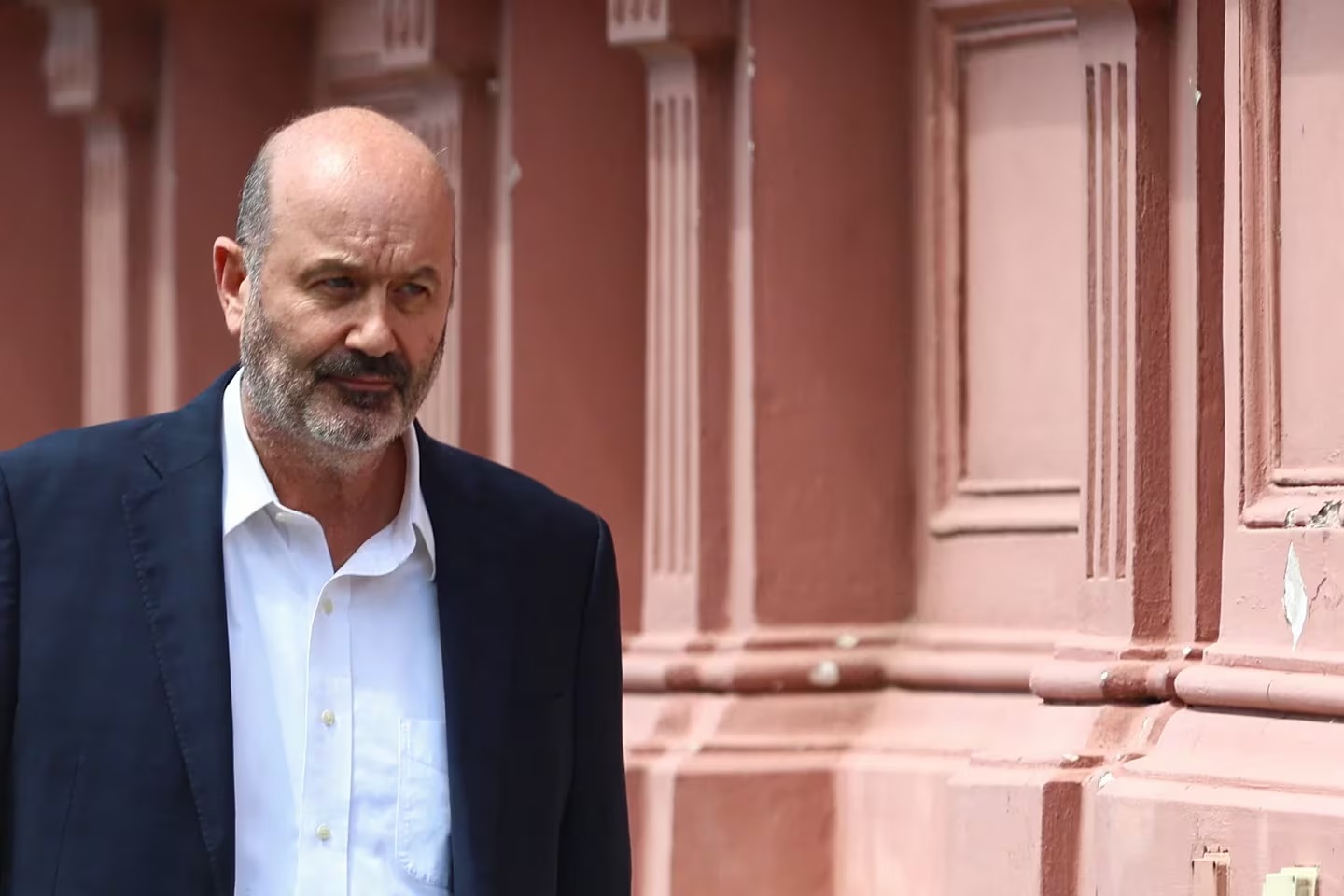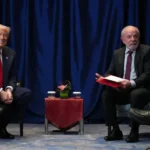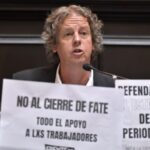
Federico Sturzenegger He was already appointed this Friday to head a new Ministry, through Decree 586/2024. After six months as an advisor in the shadows, a new Ministry was created for him cargo especially for him covering three sub-secretariats that belonged to the Cabinet Office. “Federico Sturzenegger will join the national Cabinet as a minister,” Francos said just a little over a month ago. In what role? The name has not yet been defined, but it will be “in an area that has to do with the economic deregulation“.
The former official of Me too, From the Street y Macri will have under its sphere the control of a new Ministry that would absorb functions of the Cabinet Office related to Public Employment and State Companies and Societies. The “economic deregulation” initiated in the DNU and the Ley Bases promoted by it is nothing other than the plan of privatization and “sanitation” of public companies. Companies such as Aerolíneas Argentinas, Correo Argentino or Aysa would be in their orbit.
His entry into the cabinet occurs in the midst of a economic and political crisis in the Government, since despite having obtained an agonizing approval of the Bases Law, based on corruption and repression, the economic contradictions that are expressed with the The rise of the dollar and devaluation pressures In recent days, more doubts have been raised about the government’s plan.
Close to Milei and praised by him for his liberal orientation, Milei had anticipated his formal entry into the Executive branch weeks ago, although it had been subject to the approval of the Law in Congress. Finally, the changes were brought forward: Francos replaced Nicolás Posse at the end of May in the Cabinet Office, and the Ministry of the Interior ceased to exist as such for its de-hierarchization to a secretariat, which would be in charge of Lisandro Catalán. But the appointment of Sturzenegger was delayed for several more weeks.
Who is Federico Sturzenegger?
Sturzenegger is not someone new in the political regime, but has held various positions since the 1990s. A typical character of “the caste.” First as YPF official during Carlos Menem’s termin the middle of the process of privatization of the energy companies and shortly before the transfer of the company to the Spanish Repsol. He then occupied the position Secretary of Economic Policy during the government of Fernando De La Rúa, in 2001from where another chapter of public debt was carried out with the “megacanje“, a fraudulent operation carried out in complicity with Domingo Cavallo that, among other things, ended in the December 2001 crisis.
In his role as a civil servant, he was also President of the Central Bank between 2015 and 2018, during the government of Mauricio Macrifrom where he did not hesitate to guarantee large-scale business for big business, speculators and the real estate lobby, and against the working people. From there he carried out a contractionary monetary policy to seek to discipline the working class through “market” mechanisms: destroying hundreds of thousands of jobs and devaluing wages.
The Central Bank subsequently guaranteed the architecture of the “financial bicycle” with the Lebac (Letters of the Central Bank) through which the mechanism of the large employers’ associations to “get into debt and flee” was oiled thanks to the high interest rates and the mobility of capital. In the first months of 2018 The Central Bank lost almost US$ 15 billion in reserveswhere large investment banks such as JP Morgan benefited, making huge speculative profits by switching to the dollar.
Also during his time at the Central he devised the UVA mortgage loan scamwhich many families still suffer today and which Milei’s administration is trying to relaunch. In favor of the real estate lobby, he promoted in the DNU the repeal of the rental lawas well as an endless number of market “deregulation” modifications that gave free rein to price increases and inflation.
Before that, he was also president of the Banco Ciudad de Buenos Aires between 2008 and 2013, and a national deputy (PRO). In the last elections he was campaign advisor to Patricia Bullrich and from there he strengthened his ties with Milei. In the last six months he was responsible for the main anti-worker reforms of the Government, making together with the large economic groups such as Techint and Corporación América the mega DNU 70/2023 of deregulation of the economy and the drafting of the Ley Bases, both the first failed attempt and the project that is currently being treated in the Senate.
Deregulate and privatize
“I don’t have the name, we’re going to discuss it with the president, the role is going to be deregulation. It’s important that someone looks at deregulation in a global way,” Francos had celebrated the imminent arrival of Sturzenegger, whose task until now he described as “titanic.” Another former official of the Macri administration will arrive with him, the economist Lucas Llach, who was his vice president at the Central Bank. Together they were involved in the failure of the “inflation targets” in 2018 and his departure from the entity, replaced by Luis Caputo, with whom he continues to have a dispute.
If the above is confirmed, they will be in charge of a large part of the public companies and the treatment they will receive, promoting privatization wherever they can to guarantee friendly business. Although since the first version of the Omnibus Law the list of state companies to be privatized has been considerably reduced, there are still some very important ones under scrutiny.
The first list had the objective of sweeping away 41 state companies, the half sanction that came out of the Deputies included 9 companies. Four with the category of ““total privatization”: Aerolíneas Argentinas, Enarsa, Argentine Radio and Television and Intercargo. And five others as possible to be granted: Aysa, Argentine Post Office, Belgrano Cargas, Road Corridors and Railway Operating Company (Sofse).
The finally approved version of the law removed Aerolíneas Argentinas, public media and Correo Argentino from the payroll. The following were up for privatization: Intercargo SAU; Enarsa; Argentine Nuclear Power Plant; Rio Turbio Coalfields. The following were up for privatization/concession: Argentine Water and Sanitation SA; Belgrano Cargo and Logistics SA; Railway Operating Company SE (SOFSE); Road Corridors SA
With a very reduced Bases Law in terms of the privatization chapter, thanks to the fight from below against this advance, Sturzenegger will be in charge of the continuity of scrapping of public companies through government-appointed auditors.
In the case of Aysaits staff was reduced by 800 employees, 600 through voluntary retirement and 200 through layoffs, out of a total of 7,400; Argentinian airlines Air routes have already been eliminated and ground staff reduced through voluntary retirements, while layoffs have been made, especially in outsourced companies such as GPS, which have been resisted by their workers. Argentine Mail The staff was reduced by 20 percent, with 2,000 voluntary retirements and 1,100 contracts not renewed. The news agency Telamits 700 workers have remained on leave since the closure was announced in early March, with a voluntary retirement plan open.
In the case of energy companies (Enarsa, Cammesa, Yacimientos Río Turbio, YPF) and transport companies (Belgrano Cargas, Ferrocarriles Argentinos), they fell under the control of Luis Caputo’s Ministry of Economy.
Source: www.laizquierdadiario.com

